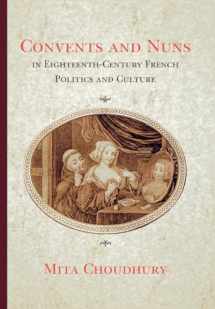
Convents and Nuns in Eighteenth-Century French Politics and Culture
ISBN-13:
9780801441103
ISBN-10:
0801441102
Author:
Mita Choudhury
Publication date:
2004
Publisher:
Cornell University Press
Format:
Hardcover
248 pages
FREE US shipping
Book details
ISBN-13:
9780801441103
ISBN-10:
0801441102
Author:
Mita Choudhury
Publication date:
2004
Publisher:
Cornell University Press
Format:
Hardcover
248 pages
Summary
Convents and Nuns in Eighteenth-Century French Politics and Culture (ISBN-13: 9780801441103 and ISBN-10: 0801441102), written by authors
Mita Choudhury, was published by Cornell University Press in 2004.
With an overall rating of 4.1 stars, it's a notable title among other
books. You can easily purchase or rent Convents and Nuns in Eighteenth-Century French Politics and Culture (Hardcover) from BooksRun,
along with many other new and used
books
and textbooks.
And, if you're looking to sell your copy, our current buyback offer is $0.3.
Description
Representations of convents and nuns assumed power and urgency within the volatile political culture of eighteenth-century France. Drawing from a range of literary, cultural, and legal material, Mita Choudhury analyzes how, between 1730 and 1789, lawyers, religious pamphleteers, and men of letters repeatedly asked, "Who should control the female convent and women religious?" These sources chronicled the conflicts between nuns and the male clergy, among nuns themselves, and between nuns and their families, conflicts that were presented to the public in the context of potent issues such as despotism, citizenship, female education, and sexuality.The cloister operated as a symbol of despotism, the equivalent of the Sultan's seraglio or the King's Bastille. Before 1770, lawyers and magistrates praised nuns as the personification of virtuous Christian women, often victims vulnerable to those who would use them to further their own political ends. After 1770, men of letters evaluated nuns according to more secular norms, and concluded that the convent had no purpose in society, except as a reminder of the problems inherent in the Old Regime. Choudhury elaborates on how nuns were not always passive entities, mere objects to be shaped by the political needs of others. But because they relied on men in order to make their voices heard, the place of women religious in the public sphere was a complex one based on negotiations between female action and male subjectivity. During the French Revolution, whatever support they had enjoyed was lost as republicans and moderates began to see nuns as potentially disruptive to the social order, family life, and revolutionary values.


We would LOVE it if you could help us and other readers by reviewing the book
Book review

Congratulations! We have received your book review.
{user}
{createdAt}
by {truncated_author}


